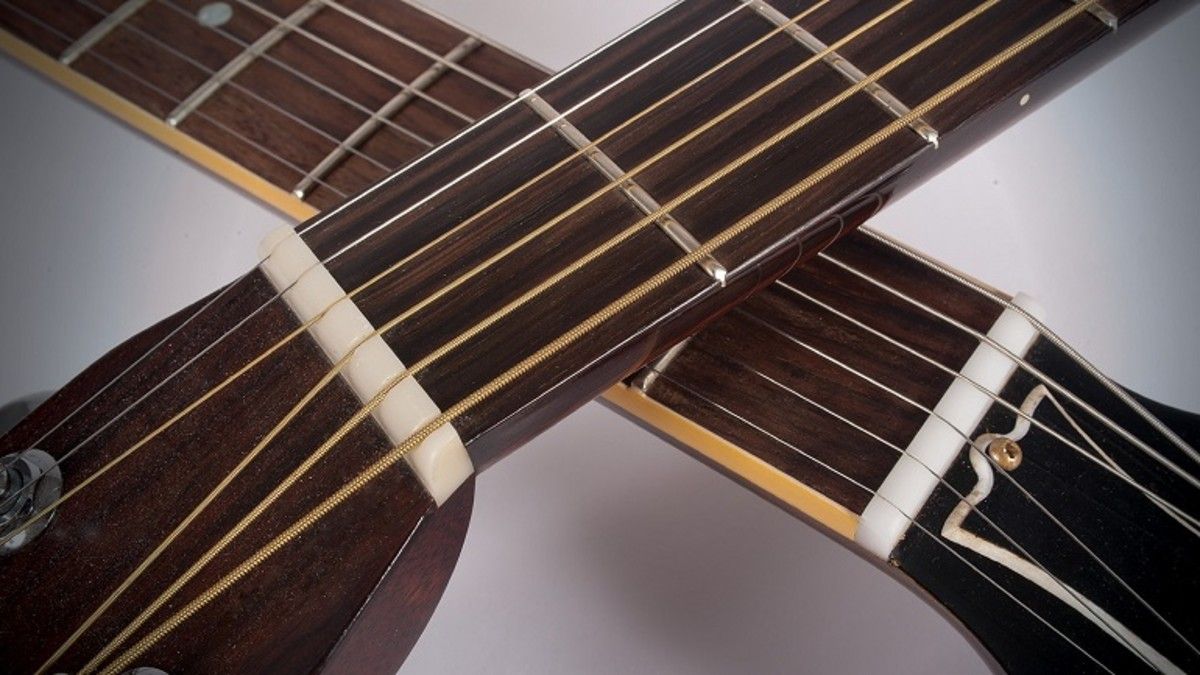Contents
Owing to the importance of guitar nuts, it’s only natural for Tusq nut vs bone neu to attract special attention from music enthusiasts. Both materials have their pluses and minuses so one should outmatch the other in certain settings. Unable to make up your mind? Then you should spare a bit of time to take a look at this article.
What is Tusq Nut?
A brand name for an alternative guitar nut material, Tusq attempts to replace bone as the best nut for acoustic guitars. They are made of high-quality polymer molder under high levels of pressure and heat to mimic or even exceed the qualities of bone nut.
Through this precise engineering, they are found to have better sustain, more volume and more consistent and effective than bone. With this, they deliver a rich tone and crystal clear bell-like high-end response. Since it’s consistent, there are no dead spots or flats and is a very rigid material.
What is Bone Nut?
As the most popular and probably the best material for nut construction, the bone nut is widely installed on high-end guitars. It’s hard, dense, and light material that offers incredible resonance and better sustain when properly installed. It offers remarkable strength against mechanical shocks and it’s very reliable especially when lubricated.
Any bone can be used for the nut, for as long as it’s dense and works well. However, recently, the cow bone or American buffalo bone is more preferred, specifically on the femur and humerus bones or from the pelvis or tibia. Asian-made guitars have nuts from water buffalo or camel.
Nothing is as sexy as a well-polished bone nut. And, as the “king of nuts,” it offers a well-balanced tone, especially on open strings. All bone nuts are carved from scratch to fit the guitar. Since they are made from organic, real bones, there may be some inconsistencies and dead spots. Still, bone has proven its worth over the years.
Tusq Nut vs Bone: Similarities and Differences
When comparing plastic and a bone, it’s clear that the bone will dominate. However, Tusq is not just any plastic. So, let’s compare their similarities and differences in terms of performance, looks, and overall tonality.
Performance:
Based on the specifications, Tusq and bone nuts are the same in terms of sustain, volume, and resonance. Though Tusq is technically plastic, yet through its high-precision process, it offers a consistent and uniform slab or nut. Since bone is an organic material, it can have soft spots and the density throughout the material is inconsistent. So, in other words, Tusq is denser and more consistent that bone.
Looks:
Since bone nuts are natural, they look sexy and retains the color of the bone it’s taken from. However, Tusq can also be processed to imitate the structure and color of the bone nut. In terms of appearance, they are identical. If you want to know if your guitar nut is a bone or a Tusq, this YouTube video shows two very simple techniques on how to identify the nut material:
Tonality:
Although it’s hard to determine the effect of the nut material on the overall sound of the guitar, some say that Tusq offers a brighter tone compared to bone. However, this will not always the case as the guitar sound doesn’t only depend on the nut, but a lot of other factors.
Tusq Nut vs Bone: Advantages and Disadvantages
Like any nut material, the bone and Tusq nuts have advantages and drawbacks. Some players want to stick to a bone nut, while others want to try this modern nut material. If you want to change the nut of your guitar, you should know that it’s a bit expensive, especially if you’ll ask a luthier to do it. Anyways, there are a few advantages and disadvantages for both Tusq and a bone nut.
Tusq Nut:
+ They have more consistent density throughout the material
+ Easy to shape
+ Better than a plastic nut
+ Has more volume and better sustain
– Has thinner response, though they claim to have better bass response
Bone Nut:
+ Easy to use and to setup
+ Last longer than Tusq
+ Not that costly
+ Great when working on string relief, angling and slotting
+ Self-lubricates and keeps the string in proper tuning and pitch
+ Has a warmer and smoother tone
– Inconsistent density and may have dead spots since it varies from the source
Conclusion
Overall, Tusq nut vs bone argument offers a lot more information to everyone. Both are excellent materials for nut construction. Which is better? That’ll depend on the player. There isn’t much difference in terms of sound, unless you have a very trained ear. You don’t need to change anything about your nut if you find it perfect for your guitar.
Using either Tusq or bone varies from guitar to guitar. Some guitars are better with Tusq nut, while others are awesome with the traditional nut material. So, what you should do is try and compare. You can change your guitar nut from bone to Tusq and vice versa, and check which is better for you. Remember, the nut material only has a tiny effect on the overall sound, but it has a very important role in your guitar.

Hi music fan! I am Jeff. Hope that you enjoy some stuff I shared here in my personal blog.
About myself, Currently I am in charging as Artist Manager/Music Supervisor at 72 Music Management. I did managed album to Grammy Award in 2017 with 7 Nominations from 2014-2020 and had the opportunities to work with : A.J. Croce, Blind Boys of Alabama, Bobby Rush, Dom Flemons, Dustbowl Revival, Sarah Grace
Governor of the Memphis Chapter of The Recording Academy is one of a award that I am lucky to achieved.


